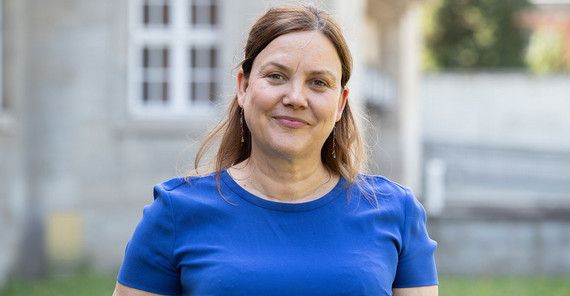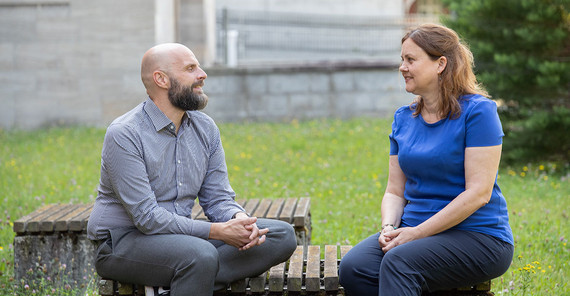Cucumbers can be crooked
“The EU is my passion,” adds Prof. Dr. Christian Rauh, a professor at the University of Potsdam with a joint appointment at the WZB Berlin Social Science Center, who analyzes various levels of political systems. “Rough estimates suggest that there are currently around 40,000 legal acts within the EU that directly affect us as citizens: How is our food labeled? How do farmers cultivate their fields? What rights do I have as a passenger?” To counter the accusation of over-regulation, the scientist explains: “In principle, international agreements are based on voluntary contractual solutions. Member states agree on goals that are often defined in great detail, to ensure transparency and to give all parties involved a fair chance.”
“Populists like to challenge international organizations,” Prof. Liese emphasizes. “Especially since they limit national autonomy and incur costs through membership fees. However, such organizations have greatly facilitated the cross-border exchange of knowledge, goods, and cultural assets – key drivers of economic globalization.” At this point, Prof. Rauh dispels a common misconception. “There is no EU rule requiring cucumbers to be straight. Instead, categories were defined for cucumbers at the request of European trade companies to simplify transportation and packaging,” the political scientist clarifies. “Anyone can still sell curved cucumbers; the rule was merely about facilitating cross-border trade.”
“Crooked cucumbers have always been unpopular,” notes Prof. Dr. Thomas Sommerer, who researches international organizations at the University of Potsdam. “Yet product regulation is one of the most important factors in the success of the European single market,” he concludes. This also applies to trade beyond the EU. “This attention to detail ensures that the rules are followed,” Liese adds and explains it to her students using the example of “a cleaning schedule in a shared apartment, where flexible agreements would also hardly be effective.” But how can we measure whether international organizations are acting effectively? “This is complex,” Sommerer says. First, you look at the organization itself: “Is it simply following the agendas of powerful members, or does it focus on real solutions? That is quite trivial,” the political scientist says. “The second step is to check whether established rules are being followed. In other words, are the states actually doing what they have previously agreed?” In the third step, the focus shifts to analyzing effectiveness. “It is important to evaluate short-term and long-term outcomes, as success is not always immediately visible.” Prof. Rauh emphasizes that “the first step is crucial in research on the EU. Is the institution actually in a position to make joint decisions? Who influences these decisions? Whose interests are considered? These are the questions that concern me as a researcher,” he says.
Veto right and peace missions
Another factor that adds complexity are various assessments that can easily obscure the analytical lens: “Above all, the perspective of affected actors should be clearly presented. Russia, for example, might assess the work of the UN Security Council as very effective,” Prof. Sommerer makes clear, “because the veto power can do what it wants. From a German perspective, on the other hand, there is a standstill.” Prof. Liese points out that efficacy research looks at the entire process in order to assess the extent to which a change in behavior can be attributed to the “output of an international organization.” For example, research has found that peace missions are only deployed very late in conflicts under very difficult conditions. “Peace is therefore usually fragile and the results fall far short of our expectations,” the political scientist summarizes.
Especially with regard to climate policy, critics accuse international organizations of treading water and taking far too long to achieve the goals they have set themselves. “There is a complex negotiation process behind this,” Prof. Sommerer explains. “The so-called Green Deal links climate policy goals with compensation payments. This is happening more slowly than we would like, but without such a deal things would probably look much worse in terms of environmental policy.” Every country should see itself reflected in global agreements and be kept engaged to create incentives for a solution. “If climate protection were decided by a simple majority,” the researcher argues, “those who were outvoted would do everything to delay implementation or disrupt the process.” This would then lead to less ambitious agreements, but at least they would be adhered to, Prof. Liese adds.
“We must not forget how complex the interests are. Many countries and private actors earn money with things that are not beneficial for climate protection,” she argues. “Reconciling all of this – short-term and long-term goals – is extremely difficult.” The researchers also suggest scrutinizing the policies of nation states: How successful were the national COVID measures? Is the basic income scheme proving to be an effective instrument? “Here, research could analyze effectiveness. However, political parties mostly debate these things among themselves,” Prof. Sommerer regrets. “Scientific findings rarely play a role.”
The future of international relations
In political science the theory generally persists that international collaboration is altogether stagnating. “No new international organization has been founded for the last 10-15 years,” says Prof. Sommerer. His colleague Prof. Liese sees a “certain nostalgia” from the 1990s here. “After reunification, at the end of the East-West conflict, during the growth of the EU, everyone thought multilateralism was good. It sounded somehow easy and positive.” However, the narrative has changed, also because the USA under Donald Trump has shown that it is possible to turn away from the World Trade Organization (WTO). “In addition, the focus is shifting to the global South,” Liese explains, “which very much wants to assert its interests in international forums and organizations. In this respect, divergences of interest and the fragmentation of power must be taken into consideration in the overall assessment,” she emphasizes. “And there is something else,” Rauh adds, “in addition to states, the public is an increasingly relevant player in international politics. Trump is probably one of the best examples of this, as well as Viktor Orbán for the EU. Both show how they act against international collaboration for domestic political reasons to make their mark at home.” Public opinion about global crises that come from outside and equally affect several countries, such as the Russian war of aggression in Ukraine, is therefore playing an increasingly important role. “It is therefore understandable that the EU member states were able to agree on sanctions very quickly – even though there was no treaty basis for them at all.”
Prof. Liese would like to see more interest in research on international organizations. “I would be happy if we would just be able to counter the criticism of international agreements.” This also means increasing the pressure on states that no longer want to support certain organizations financially. Her colleague Prof. Rauh would like to see better communication between international organizations. “Nowadays, it’s much more about keeping the public on board and convincing them that certain measures are right,” he explains. “Communicate less abstractly and explain more in concrete terms,” is his recommendation. Prof. Sommerer takes up the central question of the effectiveness of international organizations. “If we can scientifically demonstrate what works well and effectively and why,” he sums up, “we make a meaningful contribution and influence public discourse.”
Christian Rauh has been Professor of Politics of Multilevel Governance at the University of Potsdam with a joint appointment at the WZB Berlin Social Science Center since 2023.
“For me personally, Europe means that I can simply travel and exchange ideas across borders without thinking about it. But when I think about Europe, I also think about the conflicts and the complexity of common (or less common) political decisions.” - Prof. Dr. Christian Rauh
Andrea Liese was Professor of International Organizations and Policy Fields at the University of Potsdam since 2010. Since 2020, she has been Professor of International Relations at Potsdam.
“I have long associated Europe with a space of cultural and social diversity, freedom, and rule of law. This picture, however, is increasingly overshadowed by shame and concern about the marginalization and exploitation of others.” - Prof. Dr. Andrea Liese
Thomas Sommerer has been Professor of Political Science, with a focus on International Organizations, at the University of Potsdam since 2020.
“For me, Europe stands for the confidence that states – and their citizens – are able to realize, despite historical conflicts, cultural barriers, and different languages, that they can benefit from peaceful collaboration, even when this involves a long path to reach even just a small common denominator. Personally it also means to be able to study, work, and live (almost) without hurdles beyond your own linguistic and cultural horizon.” - Prof. Dr. Thomas Sommerer
This text (in german language) was published in the university magazine Portal - Zwei 2024 „Europa“ (PDF).





